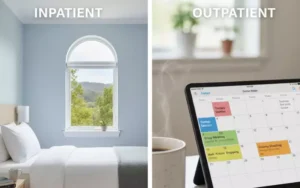Choosing the Right Treatment for Cocaine Addiction
Cocaine addiction is serious, but recovery is possible with the right support. If you or someone you love is considering treatment, you may wonder whether inpatient or outpatient care is the best fit. These two approaches share the same goal: lasting recovery, but they differ in structure, intensity, and daily life impact. At Heartfelt Recovery Centers in New Hampshire, we guide individuals and families through these choices with compassion and expertise.
What Is Inpatient Cocaine Rehab?
Inpatient cocaine treatment means living at a recovery center full time. Care is available 24/7, with medical supervision and a structured schedule of therapies, group support, and healthy daily routines.
Benefits of inpatient cocaine rehab include:
- A safe, drug-free environment
- Medical support during detox and withdrawal
- Daily therapy and peer support
- Distance from triggers and high-risk situations
Inpatient care is often best for people with severe addictions, frequent relapses, or limited support at home.

What Is Outpatient Cocaine Rehab?
Outpatient cocaine treatment allows you to live at home while attending therapy sessions several times a week. This structure is flexible, making it easier to continue work, school, or family commitments.
Benefits of outpatient cocaine rehab include:
- Flexibility to maintain daily responsibilities
- Lower costs than residential care
- Access to family and community support
- Step-down care after completing inpatient treatment
Outpatient programs work best for those with mild to moderate addictions, strong support systems, or as ongoing care after residential treatment.

Key Differences Between Inpatient and Outpatient Cocaine Treatment
Here’s a side-by-side look at what sets these programs apart:
| Factor | Inpatient Treatment | Outpatient Treatment |
| Care Setting | Live at the recovery center | Live at home |
| Structure | 24/7 supervision and daily schedule | Flexible sessions several times a week |
| Best For | Severe addiction, relapse history | Mild to moderate addiction, strong support |
| Cost | Higher due to residential care | Lower overall |
| Duration | 30–90+ days | Weeks to months, part-time |
| Accountability | High, constant monitoring | Moderate, relies on personal commitment |

How to Decide Which Option Is Right for You
Choosing between inpatient vs outpatient cocaine treatment depends on several personal factors:
- Severity of use: Inpatient is often best for long-term or heavy cocaine use.
- Support system: Outpatient works better if family and friends can provide accountability.
- Mental health needs: Inpatient may be recommended for dual diagnosis care, where addiction and mental health conditions are treated together.
- Financial situation: Outpatient tends to be more affordable, though both may be covered by insurance.
If cocaine is only one part of a larger pattern of substance use, our illicit drug addiction treatment in New Hampshire programs provide a more comprehensive approach to care. At Heartfelt Recovery Centers, our team helps you weigh these factors and create a plan that fits your unique needs. Explore our addiction treatment programs in NH to see available options.
Insurance and Payment Options
The cost of treatment can feel daunting, but many insurance plans cover both inpatient and outpatient rehab. To make it easier, our team can help you verify insurance quickly and confidentially.

Related Resources
For deeper insights into substance use and treatment:
- Learn more about how many grams are in an 8 ball of cocaine to better understand common drug terms.
- Explore the top detox options near you to see how detox fits into the recovery journey.
- Read about navigating the recovery journey: PHP, IOP, and outpatient therapy for a closer look at program differences.
FAQ: Inpatient vs Outpatient Cocaine Treatment
What is the difference between inpatient and outpatient cocaine rehab?
Inpatient rehab provides 24/7 residential care, while outpatient programs allow you to live at home and attend therapy part-time.
Which type of cocaine treatment is more effective?
Effectiveness depends on individual needs. Inpatient is often best for severe addiction, while outpatient works well for moderate cases or as continued care. Many people benefit from a continuum of care, starting inpatient, then stepping down into outpatient for ongoing support.
How long does outpatient cocaine treatment last?
Outpatient programs may last from several weeks to several months, depending on progress and individual needs.
What factors should I consider when choosing inpatient vs outpatient rehab?
Consider addiction severity, mental health needs, support at home, and finances. A treatment professional can guide you toward the best fit.
Does insurance cover inpatient or outpatient cocaine rehab in New Hampshire?
Yes, many plans cover both. Our team can help you verify insurance to confirm coverage.
Support Is Here for You
Whether you’re leaning toward inpatient or outpatient care, what matters most is taking the first step. Both options can lead to lasting recovery when supported by compassionate professionals.
If cocaine use is part of broader substance misuse, our illicit drug addiction treatment in New Hampshire programs can provide the specialized care you need.
If you or someone you love is ready to heal, Heartfelt Recovery Centers in New Hampshire is here to help. Call today to verify insurance and explore your treatment options.







